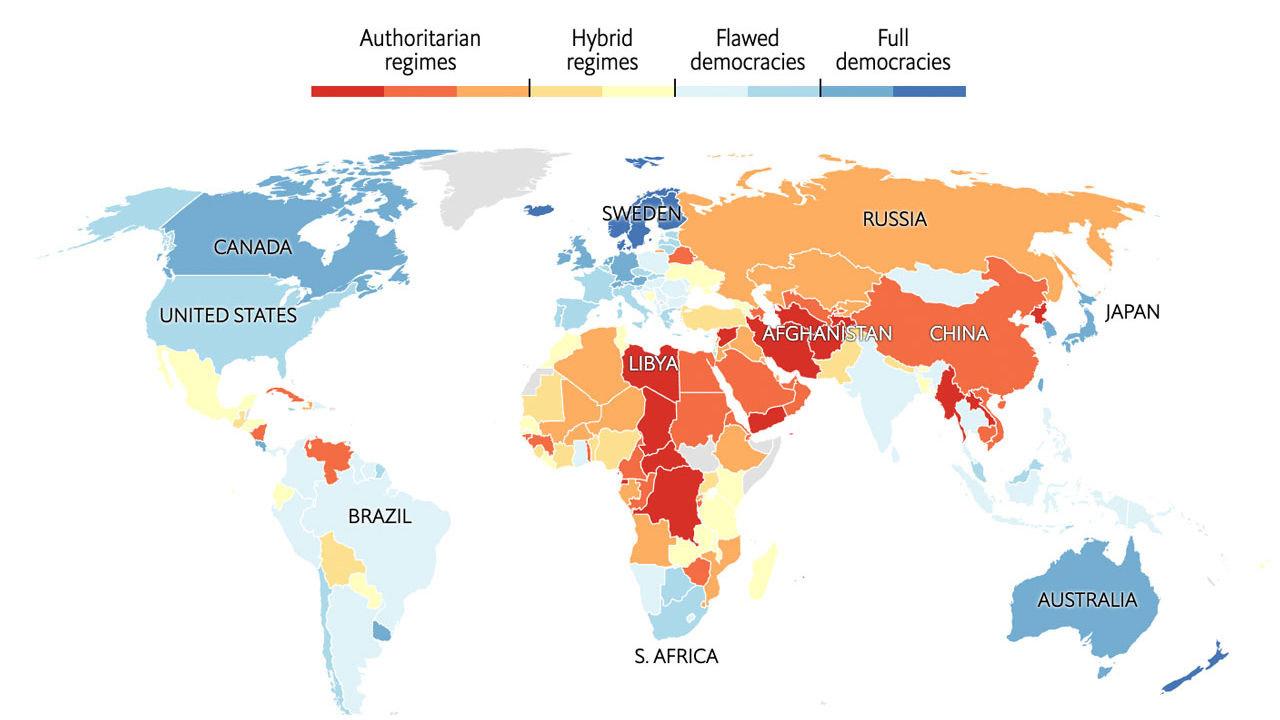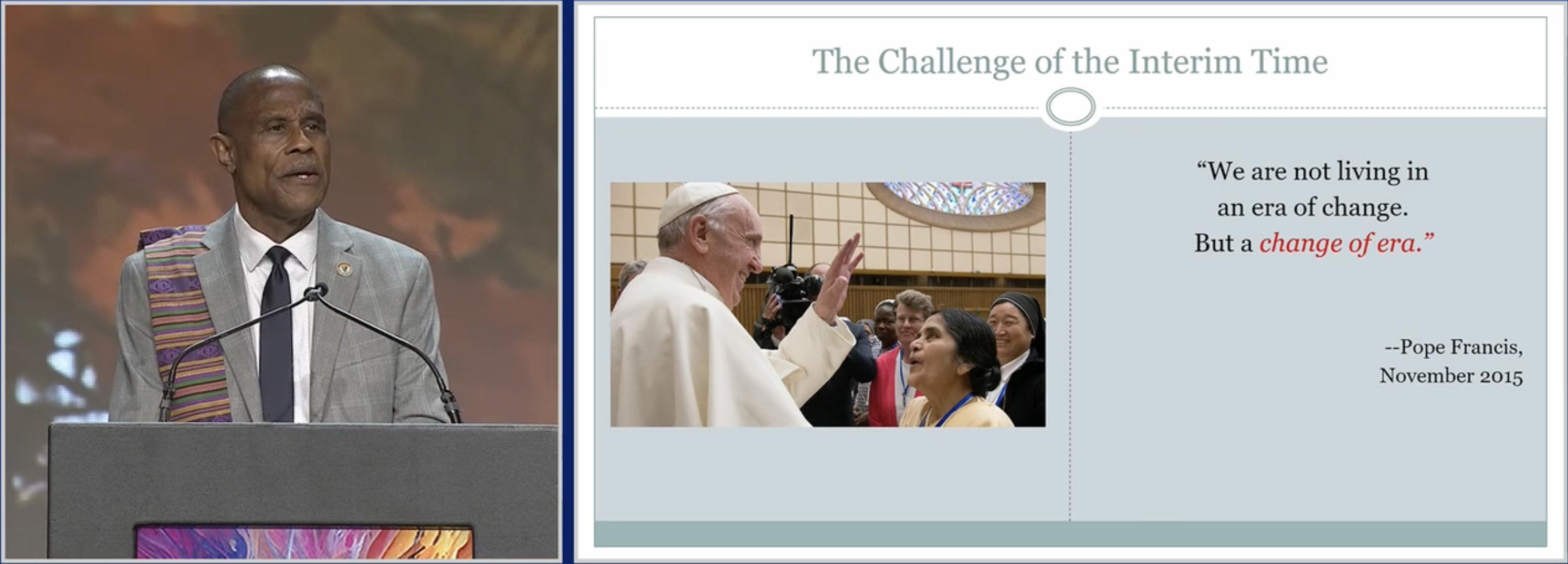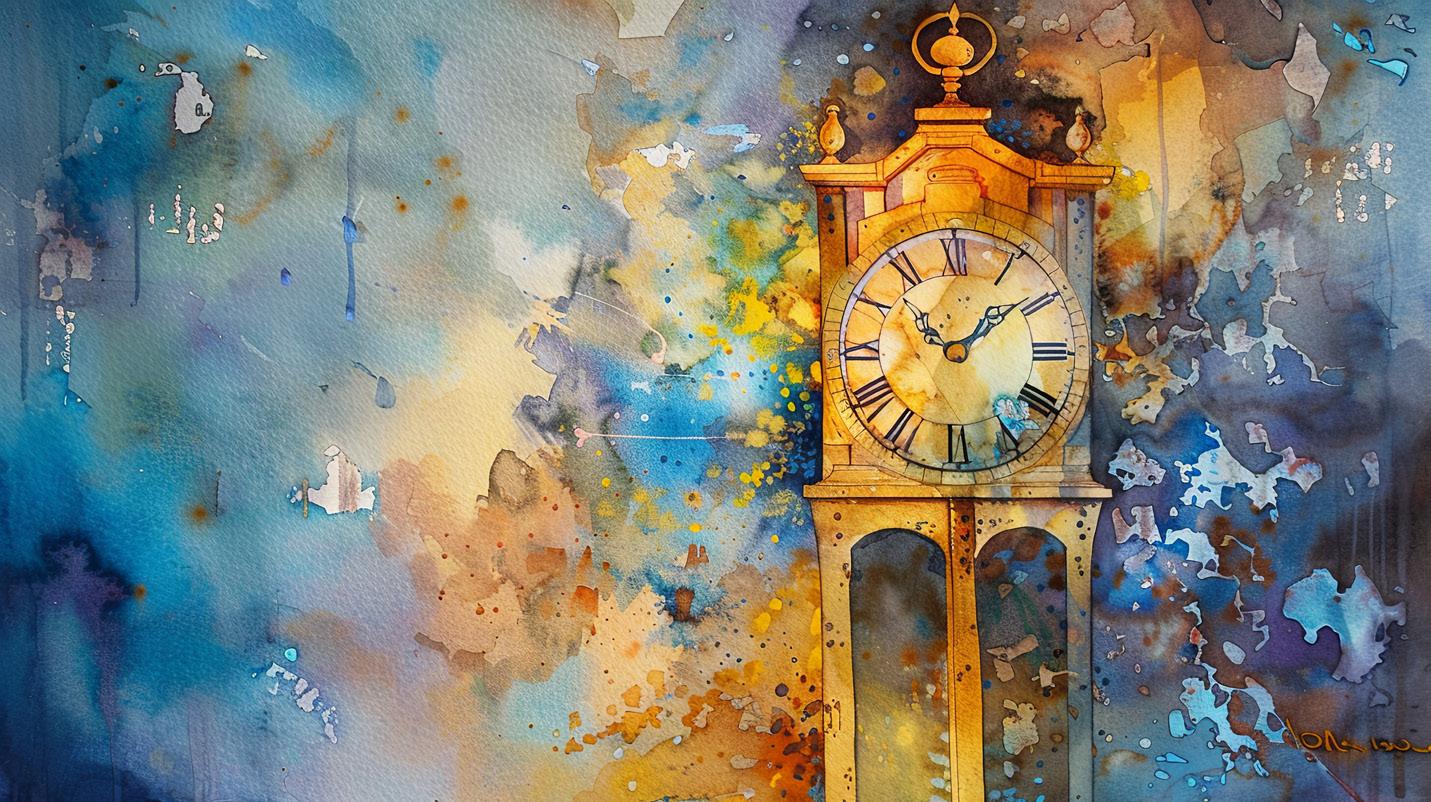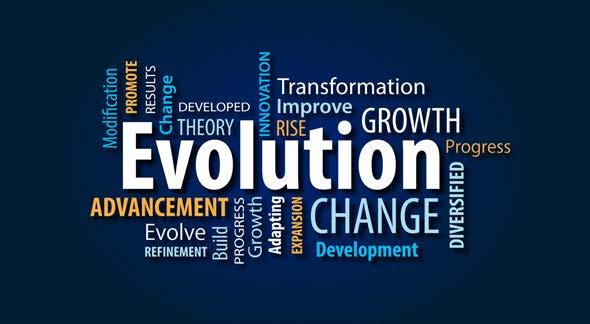A Letter from Francis about:
AA CHANGE OF EPOCH A

A motu proprio is an apostolic letter personally signed by the pope indicating his special interest in the subject. In this motu proprio Pope Francis approved new statutes for the Pontifical Academy of Theology. 21 December 2013
If theology is to be enhanced in the future, it is not enough to repeat the formulae and acts that derive from the thinking of past times. Its vocation is located in the present time in order to interpret prophetically and in new ways which look forward into the future. Beneath the light of Revelation, theology has to face the profound cultural changes [of our time], conscious that: ‘What we are living through is not simply a time of change, but a change of epoch.’1
EXPANDING THE SPIRIT OF DEMOCRACY
Mary Evelyn Tucker — graduate of School of the Holy Child, Suffern, NY; long-time friend of SHCJ; lecturer & research scholar, Yale University; co-director of the Yale Forum on Religion & Ecology; article adapted from Orion Magazine, December 2024
HOW MIGHT WE unlock hope in an expansive spirit of democracy for present and future generations in this time of upheaval? ….
Can we own our past and create a more equitable society, just economics, and inclusive politics? May we ask forgiveness and restore compassion? Can we recognize that democracy rests on peace, not violence and bloated military budgets? In short, how can we rediscover and expand the spiritual roots of democracy?
As these roots lie in the hope of living with inclusive representation in government, with equitable participation in society, and with fairness of opportunity for education and jobs, our challenge is how to make this viable. This will be impossible without a recognition that humans are interwoven with each other and with the larger kinship of life – interconnected and interdependent. This is because relationality is at the heart of life. In this spirit, an authentic democracy affirms the inherent dignity of humans and the intrinsic worth of nature.
Our task, then, is to enhance the wellbeing of both humans and nature as a basis for a truly comprehensive democracy …. In this search to expand what community is, we might first examine some historic documents that led to our democracy today, imperfect as it is. These are noteworthy to build on, but we need to enlarge their potential.
a Greek democracy — limited decision-making to an elite and excluded others, such as enslaved people.
a Magna Carta (1215 ) — began to limit monarchial rule, but privileged the aristocracy
a American Declaration of Independence (1776) — says all men are created equal, but slavery was enshrined in the social code
a French Declaration of the Rights of Man and the Citizen — equality, liberty, and fraternity were noble aspirations but not realized in the colonial and postcolonial periods OUR QUESTION IS how can we find our way back to being members of the Earth community on this precious blue green planet that has given birth to an extraordinary diversity of life — human and more than human?

Where do we look for aspiration and inspiration to be reunited with the spiritual roots of our democratic yearnings?
aWe must begin with indigenous traditions that have strong cosmovisions celebrating the kinship of all life forms and communitarian social ethics that emphasize a shared common good ….
aWe must examine global statements of the last forty years pointing to a broader spirit of democracy that includes both people and planet. We can start with the UN World Charter of Nature (1982) ….
aAnother document we may cite is the Universal Declaration of the Rights of Mother Earth (Earth Day 2010) ….
What distinguishes the World Charter for Nature, the Earth Charter, and the Universal Declaration of the Rights of Mother Earth is that they are planetary in scope and involve the expansion of rights to include all people as well as nature itself ….
aThe Papal encyclical Laudato Si’ (2010) is a letter that calls for an integral ecology that brings together the “cry of the Earth and the cry of the poor” ….
aA broader context for these documents and movements is our growing recognition that we have emerged as part of a universe story …
“Humanity is part of a vast evolving Universe. Earth, our home is alive, with a unique community of life.”
This sensibility offers a narrative that illustrates how all life originated in the cosmic explosion of stars where the elements arose. Moreover, we humans have a common origin arising out of Africa, leading to migration around the planet, and the ongoing formation of unique cultures, complex societies and varied political systems . Can we dream again amid such unraveling of life and communities? Can we revive and expand the spirit of democracy for our time, for our challenges? Can we draw on the great movements that have preceded us, such as the abolition of slavery and the fight for civil rights, women’s rights, and gay rights? Can we call on new spiritual depths that acknowledge the great mystery of being that contains us all? Can we awaken a fresh reverence for the dynamic complexity of life in which we are embedded? Such a dream may be our best hope.

RE-SOURCE #2: The Wants of This Age — Who Are We? — “Expanding the Spirit of Democracy,” January 2025
THE CHALLENGE of the INTERIM TIME
Excerpts from “Our Time is Holy: Learning & Lamenting in an Interim Time”
Bryan N. Massingale, Fordham University LCWR 2024 Annual Assembly — Orlando Florida

“The principal question I place before you as you contemplate the theme of “Our Time is Now” is this:
What does it mean to be a sign of courageous hope in a time that we do not know how to name?
The central insight I offer is this: Lament opens the space for the New, for dreams and new visions. What I offer is more of a reflection than a fully worked out thesis. Therefore, this is an invitation to dialogue and communal discernment .... the fruit of my own contemplative prayer as we ... face a world and church in the midst of unprecedented transitions and changes.
The inspiration for my reflections comes from a poem that may or may not be familiar to you. I invite you to listen to its initial stanzas as we move our minds, hearts and spirits into this time together (the emphases are my own):
Blessing for: The Interim Time
By John O’Donohue
When near the end of day, life has drained Out of light, and it is too soon For the mind of night to have darkened things,
No place looks like itself, loss of outline Makes everything look strangely in-between, Unsure of what has been, or what might come.
In this wan light, even trees seem groundless. In a while it will be night, but nothing Here seems to believe the relief of darkness.
You are in this time of the interim Where everything seems withheld.
The path you took to get here has washed out; The way forward is still concealed from you. The old is not old enough to have died away; The new is still too young to be born.”
You cannot lay claim to anything; In this place of dusk, Your eyes are blurred; And there is no mirror ....”
“I want us to dwell in this notion of being in an interim time, an indefinite time, a time unnamed and for now unnamable. We could use other words to describe this time, words such as “liminal” and “transitional.” They are apt, but they have become perhaps too familiar through casual use in our religious and formation discourse.
Interim time. Gap time. In-between time. You can’t go back, but you don’t know where forward is.
The experience is of the collapse of security and certainty in the midst of the unknown and unknowable.
In a 2015 address to a national Italian Catholic conference, Pope Francis declared, ‘We are not living in an era of change, but a change of era.’ It is one thing to live in a time of rapid and momentous changes. That is dizzying and disorienting enough. But to live in a change of era? To live on the cusp of exponentially different ways of being, thinking living, praying, and doing?
This is a challenge of an altogether different order ... a time when ‘the old is not old enough to have died away, and the new is still too young to be born.’ It is an anxious time, a fearful time. A time of loss. A time of (often unexpressed) grieving. And a time for relinquishing the old for the sake of the new. (Easier said than done).”
... I offer “the interim time” and “a change of era” as apt descriptions of this ‘holy now’ in which we live. ...I will discuss several ‘signs of the time,’ that is, seismic developments or sites of disruption that illustrate how and where I see a ‘change of eras’ occurring.
I next discuss the deep anxiety that motivates the anger, violence and fear that grips so many in our nation and our world.

I move then to outline how the deep transitions that grip our nation find a parallel in the dynamics of contemporary religious life.
I then turn to our faith tradition of lament to discern what must be done to better navigate the severe challenges that face us.
I conclude with how lament prepares us for the arrival of the new, and offer a final image that might inspire our thinking, praying and dreaming as we live in this interim time of intense and massive change.”
To view the video of the full presentation, CLICK: https://vimeo.com/998886507
Bryan N. Massingale is a Catholic priest of the Archdiocese of Milwaukee, a professor of theological & social ethics at Fordham University, New York.
Our Shifting Church — English journalist, Austin Ivereigh, reports on the Synod on Synodality in THE TABLET, October 3, 2024.
“The Instumentum Laboris (working document) names a number of the signs of the times that have surfaced on the Synod journey. One is the way our ecclesial belonging has shifted.
our ecclesial belonging has shifted
A community of faith today is not just a geographical place: we are mobile, urban creatures, who might belong at the same time to different countries as well as church movements or societies; and we increasingly spend much of our lives in a parallel digital, virtual world.
This reality “challenges the Church’s organisational forms,” notes the IL (82), for so many of our structures assume a notion of place that has been in practice superseded. Without forgetting the importance of physical context and concrete culture, we need to start seeing the Church not just as spaces but “environments and networks in which relationships can develop, offering people rootedness and a basis for mission, which they will carry out wherever their lives unfold” (86).

we need to start seeing the Church as ... environments & networks in which relationships can develop, offering people rootedness & a basis for mission
This suggests more investment in “centres” of spirituality and formation, from where – as in the Early Church — we radiate out. The call for formation has been widespread and insistent from the start of this Synod journey: in understanding how the Spirit guides the Church; in listening and group discernment; in how to include the poor and those on the periphery; in formation of faith witnesses and for preaching; in listening to the Word of God, and the voice of God in Creation... (51-66).
All this will require a major mobilisation of church resources: away from maintaining buildings, and towards such centres and networks.
LET US LISTEN

“WORD
OF GOD”
by Bernadette Farrell
Word of God, renew your people, Refrain: Make us now your living sign. Recreate us for your purpose In this place and in this time.
Word of hope and Word of healing, Word of peace and Word of justice, God alone the power we trust in, To the waters lead your people,
LET US PRAY for the world — Steve Garnaas-Holmes
Pray for the world.
Open your heart to the goodness of God, pouring out upon the world. Open your heart to the goodness of the world, the dear people, the children and women and men, the creatures, and all living things. As you open your heart, in pours their pain. Make space for their aching, their sadness, their terror, for the wounds of war and poverty and greed, the great shadow of loneliness. As the pain flows in, make more room: make room in your prayer for the grace of God, the vast mercy of the Beloved, the very atmosphere of love that fills and embraces all. Let your prayer be the world flooded with blessing, in all its wonder and pain and beauty and brokenness, the world inundated with God’s hope and tenderness. Hold that. Hold it a long time. Then carry it out into the world, your living prayer.

Praying mantises have mastered their place in the natural world, exhibiting a wide and awe-inspiring array of adaptations to their environments throughout the globe.
Nothing changes if nothing changes
“... a new way of imagining the Church is emerging, and the final document will present images to display that, much as Jesus used parables to announce the Kingdom.”
Timothy Radcliffe, OP, at presentation of final draft of Synod Document, 10/21/24

“You must not be satisfied with a kind of classroom theology. Your thinking must have its location on the very edges of the earth. Because good theologians, just like good pastors, smell the people and the street and, by their thinking, they pour oil and wine on the wounds of human beings.... theology must re-think its method and its ways of investigation.”
Franciscus, Motu Proprio, 21 December 2013
Locating turning points in history is strangely attractive. We like to account for them by the actions of great men (rarely women). Before it was like this, after it was like that, the story goes. Though in reality many influences are at work, many slow changes and complex dynamics lie between the before and after. Peruvian Dominican priest GUSTAVO GUTIÉRREZ who died on 22 October 2024, aged 96, for many in the Catholic Church, was such a man.... as the father of Liberation Theology. His thinking is the key to understanding the most important current ideas in Catholicism worldwide since the 1960s. https://www.indcatholicnews.com/news/50923
